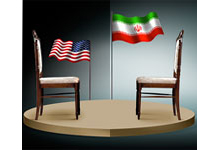An Iranian government-owned shipping line that the United States believes is integral to Iran's efforts to obtain banned technology for its nuclear and missile programs has illegally funneled tens of millions of dollars in financial transactions through the American banking system over the past three years, evading sanctions by cloaking itself in corporate alter egos and falsifying records, according to an indictment that the Manhattan district attorney plans to unseal on Monday, reported daily NewYork Times.
The 317-count indictment charges the Islamic Republic of Iran Shipping Lines and 15 other defendants with a conspiracy to set up shell companies in Singapore, the United Arab Emirates and the United Kingdom to trick major clearing banks in New York, like JPMorgan Chase, Bank of America and Citibank, into sending and receiving more than $60 million worth of payments.
The subterfuge was necessary, prosecutors said, because the Iranian company, also known as Irisl, needed access to United States banks to compete in a shipping industry that primarily does business in dollar denominations. American sanctions imposed in 2008 require United States banks to block and seize the proceeds from any transactions made in the names of Irisl or its known affiliates.
For years, the United States has warned that the state-owned shipping line engages in deceptive practices to aid the Iranian regime in its proliferation activities. Its ships, which operate throughout the world, have been caught smuggling a virtual bazaar of weapons in violation of a United Nations arms embargo.
But the grand jury indictment, the result of a 14-month investigation, represents the first time Irisl has faced criminal charges.
It may not be possible for the district attorney's office to convict the 11 corporations and 5 individuals charged in the indictment, as all are based outside the jurisdiction of the United States. But prosecutors hope the case will compel foreign banks, which have allowed companies linked to Irisl to open accounts using corporate aliases and then move money from those accounts into and out of the United States, to scrutinize their customers.
"There are banks giving them access and turning a blind eye," said Adam Kaufmann, executive assistant district attorney and chief of the investigation division. Mr. Kaufmann noted that the office's investigation was continuing and said the indictment sent "a clear message that this is criminal conduct and could expose banks to criminal liability."
The indictment comes after an investigation last year by The New York Times, which found that Irisl was setting up shell corporations across multiple continents in an attempt to make it appear as if its ships were under new ownership and management. In fact, nearly all of the new companies were wholly owned by Irisl, run by Irisl officials or set up at their behest.
The district attorney's investigation into whether Irisl shell companies were gaining access to New York banks began when a confidential source provided officials with a suspicious bank account number. Using subpoenas as well as open-source information, investigators followed the trail to other, related accounts.
District Attorney Cyrus R. Vance Jr. said the indictment demonstrated to Iran that his office would not remain idle while New York banks, "which stand at the forefront of international commerce," were abused.
Sanctions enforcement is primarily the responsibility of the Treasury Department, but the district attorney's office has a history of working closely with the federal government in this arena, claiming criminal jurisdiction because international dollar-denominated transactions are cleared through New York banks.
Mr. Vance's predecessor, Robert M. Morgenthau, took on some of the world's largest international banks for stripping information from wire transfers that would have shown the transactions originated from sanctioned countries like Iran and Sudan.






